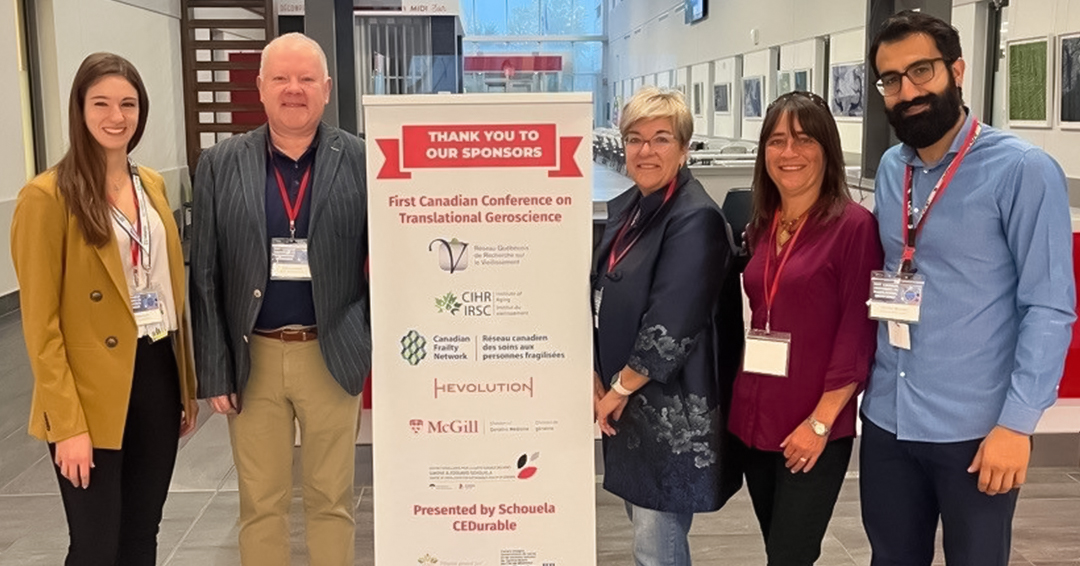
The Bone, Muscle and Geroscience Research Group at the RI-MUHC is leading the way in Canadian geroscience research
People worldwide are living longer. Today most people can expect to live into their sixties and beyond, and the World Health Organization has predicted that the number of persons aged 80 years or older will triple between 2020 and 2050.
Dr. Gustavo Duque understands the implications of these statistics. A senior scientist in the Metabolic Disorders and Complications Program at the RI-MUHC, Dr. Duque’s research is focused on the mechanisms, diagnosis and treatment of age-related conditions such as osteoporosis, sarcopenia and frailty. Recently named leader of the Special Interest Group on Geroscience at the Canadian Geriatrics Society, Dr. Duque also leads the Bone, Muscle and Geroscience Research Group at the RI-MUHC.
“Geroscience has been described as the future of geriatric medicine. Not only does it help us find ways to increase the well-being of older populations, it also moves the field of geriatrics toward more multidisciplinary and cost-effective interventions.”
— Gustavo Duque, MD, PhD, FRACP
The researchers of the Bone, Muscle and Geroscience Research Group are working to understand the biology of aging and chronic disease with the goal of improving the health of older adults. The scientists study bone, muscle and the aging process from all angles ─ from pure biomedical studies in a laboratory setting to clinical trials and public health research.
The recently coined term “geroscience” encompasses biological mechanisms that are shared by several age-related conditions. Geroscience aims to develop new biomarkers and treatments that will simultaneously target multiple conditions, thus improving efficacy and increasing the well-being of older populations.
“Geroscience has been described as the future of geriatric medicine,” says Dr. Duque. “Not only does it help us find ways to increase the well-being of older populations, it also moves the field of geriatrics toward more multidisciplinary and cost-effective interventions.”
The RI-MUHC’s Bone, Muscle and Geroscience Research group has recently become a member of the International Geroscience Task Force. “This important global organization is focused on developing the concept of geroscience, bringing opportunities to collaborate, and facilitating the dissemination of geroscience discoveries among health professionals and the general public,” adds Dr. Duque.
As part of the International Geroscience Task Force, Dr. Duque coauthored a new publication in the journal Nature Aging. The paper is entitled “Looking at frailty and intrinsic capacity through a geroscience lens: the ICFSR & Geroscience Task Force” and introduces the Task Force while also sharing a significant number of opportunities for researchers and clinicians interested in developing their research careers in the field of geroscience.
Membership in the International Geroscience Task force is not the only outreach by the Bone, Muscle and Geroscience Research Group at the RI-MUHC. The group organized the first Canadian Conference on Translational Geroscience, in collaboration with the RUISSS McGill Schouela Centre of Excellence for Sustainable Health for Seniors (Schouela CEDurable). Held at the RI-MUHC on October 6 and 7, 2023, this inaugural conference was attended by more than 60 health professionals and researchers. International and Canadian experts in the field of geroscience discussed basic biology, clinical trials and education, as well as many other aspects of geroscience, such as how to translate a geroscience-based idea into a new medication for several age-related conditions.
“Our conference brought together leaders from academia, clinical practice, industry and regulatory agencies,” says Andréa Faust, Manager of CEDurable and coordinator of the event. “The field of geroscience is new, but it is so exciting to bring together so many people who are working towards the understanding of age-related diseases and biological change, and to help ensure that more people will be able to live independent and healthy lives as they age.”

Bone, Muscle and Geroscience Research Group would like to thank the sponsors of the Geroscience Conference: The Canadian Frailty Network (CFN), the CIHR Institute of Aging, the Quebec Research Network on Aging, the McGill Division of Geriatric Medicine, the Hevolution Foundation and Schouela CEDurable.
